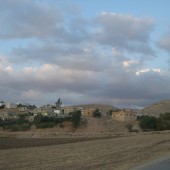A Critical Learning Cycle Model for Sustainability Education: Two Case Studies of Water Conservation Programs in Jordan
SCHOLARLY FEATURE
Sustainability education for adult learners implicitly and explicitly forms an important component of participatory sustainable community development programs that have become commonplace as part of international development practice. Community-based sustainability education programs for adults vary in their focus on content and process. Defining learning as making meaning that leads to action, we use a critical learning cycle model to analyze learning processes in two water conservation programs in Jordan, one of the world’s most water scarce countries, where sustainability education is an important part of the national water management strategy. In this model, which incorporates inspirational learning and experience-based learning, learners integrate insight and experience to create meaning and to take action. We present the findings from detailed case studies of the two programs, one of which takes a content-oriented approach to sustainability education and the other a more process-oriented approach. We used qualitative research methods including ethnographic observations and in-depth interviews with program managers and participants that we analyzed through emergent thematic coding and validated with member-checking and peer review. We observe that the process-focused program was more successful in fostering individual-, household-, and community-level change than the content-focused approach. We conclude with recommendations to develop community capacity to address complex environmental challenges including process-oriented approaches that incorporate internal learning processes and multiple cycles of experience-based experimentation. In these approaches, learners are able to apply what they have learned and test ideas as they develop a more thorough understanding of the problems at hand and their potential solutions while engaging in culturally appropriate forms of expressive self-reflection to make new ideas meaningful.
Acknowledgements
The field work for this research was supported by the Fulbright-Hayes Doctoral Dissertation Research Abroad Program, and could not have been successful without the support of Alain McNamara, and a host of Jordanian development professionals who shared their expertise and learning throughout the research process. The write-up was supported in part by the following sources: the National Science Foundation under award number SES-0924210; the Gender, Justice, and Environmental Change Program at Michigan State University (MSU), and a dissertation research completion grant at MSU.
FullPDF: HansenDannKerrJan2013Update2JSE2012











 Lexine Hansen received her Ph.D. from Michigan State University focusing on International Development and Gender, Justice, and Environmental Change in 2010. She currently serves as an American Association for the Advancement of Science Policy Fellow at the U.S. Agency for International Development on Climate Change programs and policies while advocating for a stronger social and physical science role in development policy-making.
Lexine Hansen received her Ph.D. from Michigan State University focusing on International Development and Gender, Justice, and Environmental Change in 2010. She currently serves as an American Association for the Advancement of Science Policy Fellow at the U.S. Agency for International Development on Climate Change programs and policies while advocating for a stronger social and physical science role in development policy-making.  Shari Dann is Associate Professor and Extension Specialist in Community, Agriculture, Recreation and Resource Studies at MSU. She conducts
community engagement scholarship related to the design and evaluation of conservation and sustainability learning systems. Her research and
engagement are integrated in her work with teachers, adult Extension learners, community-based natural resource organizations, and nonformal
youth programs.
Shari Dann is Associate Professor and Extension Specialist in Community, Agriculture, Recreation and Resource Studies at MSU. She conducts
community engagement scholarship related to the design and evaluation of conservation and sustainability learning systems. Her research and
engagement are integrated in her work with teachers, adult Extension learners, community-based natural resource organizations, and nonformal
youth programs.  John Kerr is Associate Professor in the Department of Community, Agriculture, Recreation and Resource Studies at Michigan State University.
His teaching and research address issues of collective action around natural resource management in developing countries.
John Kerr is Associate Professor in the Department of Community, Agriculture, Recreation and Resource Studies at Michigan State University.
His teaching and research address issues of collective action around natural resource management in developing countries. 
